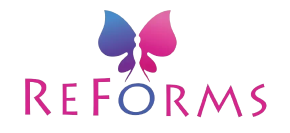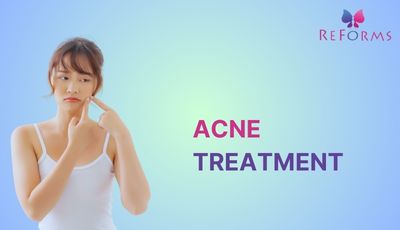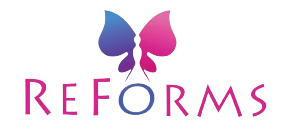Areas of skin that are elevated or pitted are acne scars. They are a direct effect of acne-related skin damage. Your body works to heal your skin by creating and synthesising collagen fibres when you have acne. Pitted scars might develop if your body doesn’t create enough collagen. Raised scars might develop if your body creates an excessive amount of collagen.
We can separate acne scars into four main categories:
- Rolling scars: Shallow scars with soft, smooth edges. These scars give the skin a wave-like appearance.
- Boxcar scars: Shallow scars with sharp, defined edges. They generally appear as small imprints on the skin.
- Icepick scars: Deep, narrow scars that resemble an empty pore in the skin. These tend to be the most difficult acne scars to treat.
- Hypertrophic or keloid scars: Raised scars that commonly appear as red spots. These scars may be itchy or otherwise irritating to the skin.
- Acne scarring is not inherited: While acne scars themselves are not a genetic disorder, your likelihood of getting acne in the first place may be affected by specific genes. If your parents suffer from acne, you may as well, which could ultimately result in acne scarring.
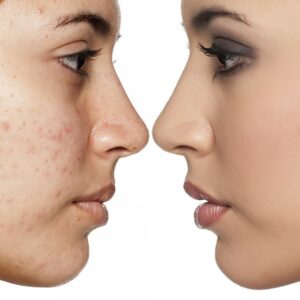
Don’t pop pimples:
It’s crucial to keep in mind that popping or picking at a pimple usually causes more harm than good, despite how tempting it may be. You leave an open wound on your skin when you pop a pimple because you let all the oil, bacteria, and debris out of the pimple and onto your skin. This interferes with your skin’s normal healing process, which not only makes acne worse but can also leave scars.
Applying hydrocolloid bandages to obstinate zits will help reduce the impulse to pop or pick at your acne. These bandages facilitate skin healing and guard against injury that can leave scarring.
Wear Sunscreen:
Acne scars and patches might become darker due to sun damage. All year long, we advise using sunscreen with a minimum SPF of 30. Your skin won’t be damaged by the sun if you continue to wear sunscreen every day, making any acne scars you develop much less obvious.
Stay Moisturized:
Maintaining hydrated skin can assist you in looking supple and healthy. By coordinating the tone and texture of your skin, moisturising not only promotes skin healing but also makes existing acne scars less obvious. We advise reducing hot showers and using moisturiser twice daily to prevent drying out your skin.
Treat your breakout:
It’s crucial to keep up with upcoming breakouts and manage your acne if you want to avoid scarring in the first place. The acne you already have can be treated with products that contain salicylic acid and benzoyl peroxide while also avoiding further outbreaks. Additionally, altering your way of life to get more sleep, keep hydrated, and change your pillowcase more frequently will help stop acne from ever starting.
There are some methods to treat acne scars:
Dermabrasion:
This effective scar removal treatment uses a high-speed brush or other instrument to resurface your skin and remove or reduce the depth of scars. It can take up to three weeks for the skin to heal.
Microdermabrasion:
For this less-intensive type of dermabrasion, a dermatologist or aesthetician uses a handheld device to remove surface skin. More than one treatment may be required, but there’s no downtime, according to the AAD.
Chemical Peels:
During a chemical peel, a chemical solution is applied to the skin. It removes the outer layer of your skin, resulting in a smoother, more even appearance. You may experience redness and peeling for three to seven days after the procedure, notes the American Society for Dermatologic Surgery (ASDS).
Micro-Needling:
Microneedling Also called collagen induction therapy, this procedure involves pricking the skin repeatedly with tiny needles to stimulate the growth of new collagen. This can reduce the appearance of scars. Microneedling can improve the appearance of wrinkles, stretch marks, and fine lines. Skin redness may last a few days, according to the AAD.
Laser Skin Resurfacing:
Your dermatologist can use a laser resurfacing treatment to remove the outer layer of your skin, contour areas of acne scars, or lighten redness around healed acne lesions. Healing may take between 3 and 10 days.
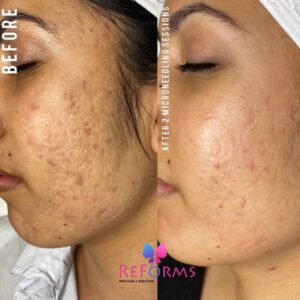
Ireform is engaged in providing unique products including Acne Scar Treatment and much more to various industries located in India as well as international industries. Ireforms is one of the most trusted and renowned skin and hair solutions that provide customers with the absolute best and the most satisfying treatments to patients at affordable costs.
